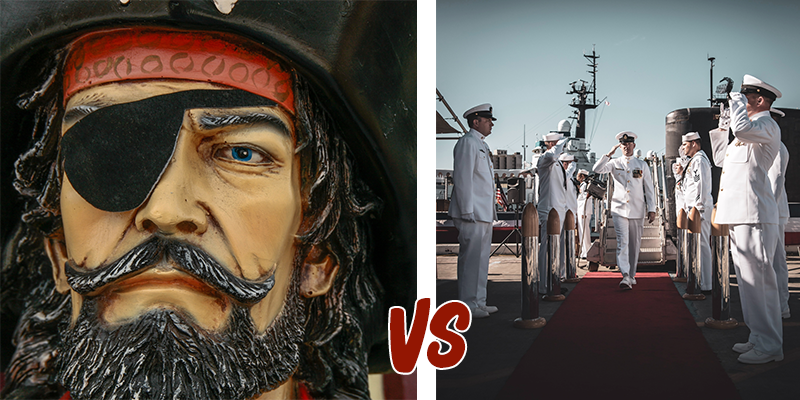
Pirates vs. navy: who wins?
The adventure
Few weeks back I had the chance to participate to the European Big Data Conference 2019, which took place in Helsinki. Apart from the fact that it was my first time ever in Finland and I did not expect such a frosting temperature in the middle of October (not January, October!), it was quite an interesting occasion to exchange thoughts, impressions – and yes, also business cards 😉 – with professionals coming from all over Europe.
One of the hottest topics at the conference was Open Innovation – yet the event schedule displayed talks, workshops and panels on this fashionable subject and it looked like a great opportunity to be there with our innovative Customer Intelligence service Tapoi. Because that was the plan: exhibiting Tapoi at the conference. Or at least it was my conviction until just a couple of days in advance to my departure.
It happened that suddenly Daniele (our CEO) got invited to a very interesting panel, not as part of the public, but as a speaker. Topic? The relationship between start-ups and corporates. He was not planning to travel to Helsinki at all, my trip was already scheduled, the invitation was not a mistake… you can imagine what came next! Natural outcome of Daniele’s thoughts, which I still recall today was “No problem, Elisa, you will take part to the panel instead of me!“. Easy peasy.
Remember the frosting cold I was mentioning a few lines back? Well, that Finnish, bitter cold that I experienced was nothing compared to the freezing cold I felt on my back when he spoke out loud like that.
But since challenges are cool and the mantra plays “if the boss says so, I can do it“, I started brainstorming with Daniele on what I could present in occasion of the panel.
The epiphany
The secret of being “remembered” when presenting at a conference, panel or whatever it is, has a lot to do with presenting something “shocking” that the audience had not expected at all. And indeed, that is exactly the strategy we embraced. While racking our brains, we came up with a pretty interesting, disruptive, but effective metaphor, which perfectly describes the eternal dichotomy between start-ups vs corporates. Pirates vs. army.
How does this sound?

Reality-check: a complicated relationship
In ancient times, the only occasion you would hear about corporations and start-ups getting together, was when the former would buy the latter. That is to say, according to our metaphor, the army conquering the pirates vessel. Today, although straightforward acquisitions are still taking place and equity investments in start-ups continue, more and more corporations are looking for something else.
The days when start-ups could play in their sandboxes while corporations stayed in their own hermetically sealed buildings are over. In fact, entrepreneurs and corporate executives are working together more than ever before, creating partnerships that financially benefit start-ups while helping big companies be more innovative. And that is exactly what Open Innovation means.
That is super nice, in principle.
When it comes to real relationships, I really wish that I could tell you a nice fairytale, with the most desirable happy ending of love stories. But, surprise surprise, based on our experience, this is absolutely not the case and reality looks pretty different, even quite distant! So, here comes our vision, that I packed in my suitcase to Helsinki, to be shared with a lot of people, peers from start-ups as well as professionals from corporates.
But before sharing some “NOT OK” situations that we have experienced with corporates, let me just give you a brief framework of our relation to the world of start-ups. Clearly, as U-Hopper, we are not a start-up anymore – but we are organised as a start-up. We have integrated the open innovation culture and adopted several business innovation working tools into our everyday work. Plus (and mostly relevant to this topic), we act as incubators of internally-developed promising technologies, as it is the case of Tapoi – and by the way, did you know that we have recently released a new demo to try? – and we are therefore continuously in touch with the world of technological innovation. To this respect, what do corporates mean to us? On the one side customers, on the other partners to the market.
You all know that start-up life is harsh and challenging, but believe me when I tell you that some difficulties can actually be avoided. Such as for instance, when we had to wait the longest 9 months of our life – and it was not about pregnancy! – to get a green flag from the legal office of a customer. Or when it took us 8 (eight!) face-to-face meetings to finally identify, reach and negotiate a very small contract with the actual decision-maker of a company. Again, when we were told that “Sorry, you can’t be listed as a supplier of ours because you don’t reach the minimum threshold of €10M of revenue“. And even when we were asked to display the ISO 27001 certification just to start off a small €10k proof of concept.
Now that you have a broad idea of what it feels like, it is time to get back to our metaphor. Pirates is us – the world of start-ups. We are passionate, we are dynamic, we need to be as free as possible from limitations and constraints to foster and boost our innovative culture and to run our business. We like to confront ourselves with the market out there and we are even ready to hear “No, you are not doing it right” (at least it is an answer!). The navy represents the world of corporates. Discipline, structured organization, overwhelmed with rules and procedures.
Deep inside, it’s not us saying this!
Mind that I am not saying that being pirates is better than being the army or vice-versa. I am just pointing out that being on one side or the other is very different and it makes it hard for corporates to work with start-ups and for start-ups to work with corporates.
Already back in 2011, Eric Ries published The Lean Start-Up, outlining a successful methodological approach to develop innovative businesses with low-risk short development cycles and rapid business viability validation. The book is the result of a deep understanding of the start-up-corporate relationship – including steps forward and pitfalls – which leaves no doubts: we need both! On the one hand, corporates have the strength to scale the market; on the other, start-ups are crucial to be always up-to-date with innovation. So, is a bird in the hand worth two in the bush? I will leave the answer to you.
I believe that there is still hope. It is clearly a matter of compromises towards a win-win situation where both parties succeed. Because in the end start-ups and corporates want the same: growth, revenue, competitive positioning. And even if it will never look like a fairytale (but more likely like a pillow battle among siblings), it is part of the game.
Did you enjoy this article?
Enter your e-mail address to receive our newsletter!
PS: don’t worry, we hate spam just as much as you do. We’ll send you just a couple of emails a year with a collection of the most interesting articles, it’s a promise!
